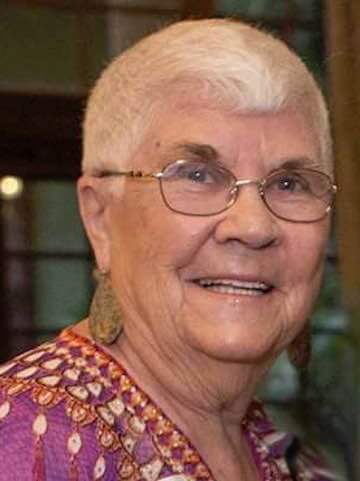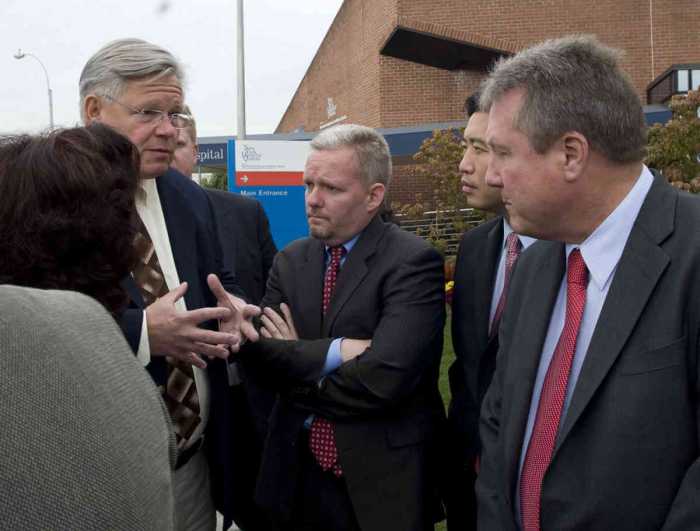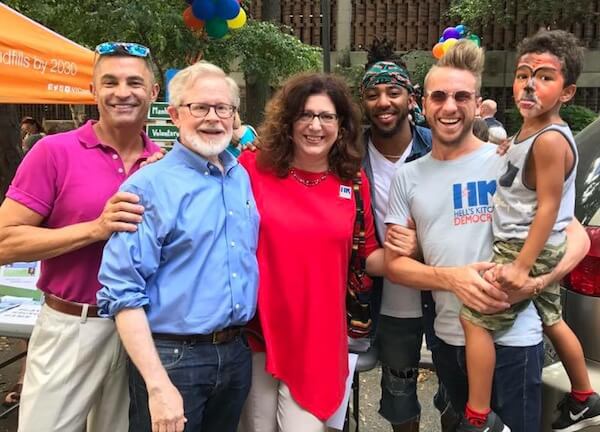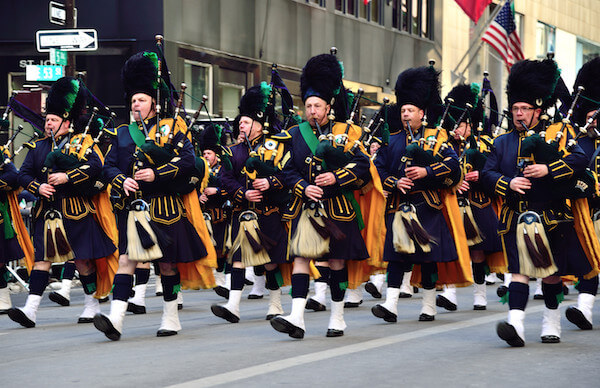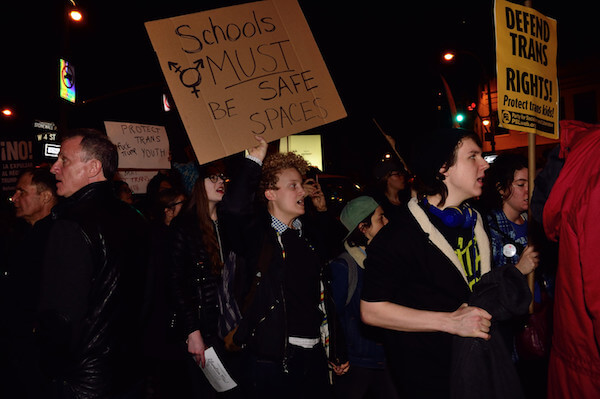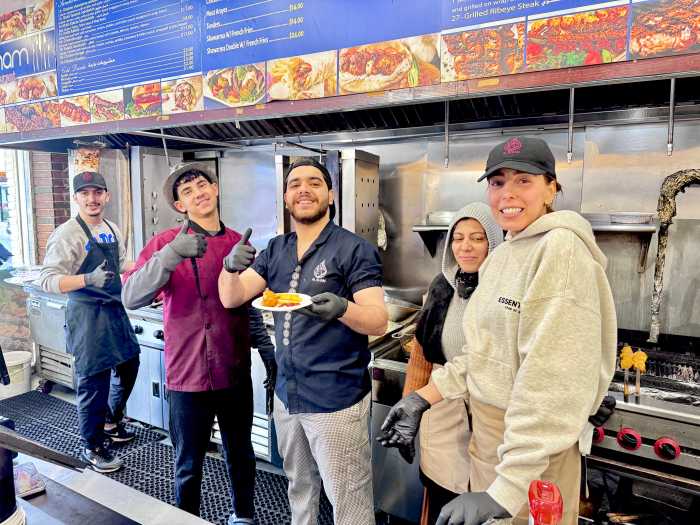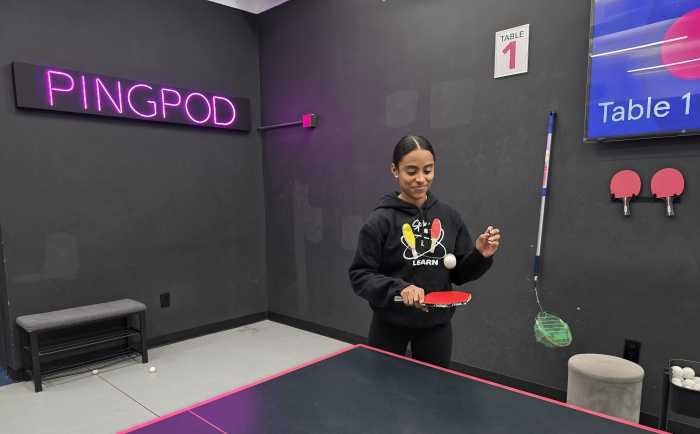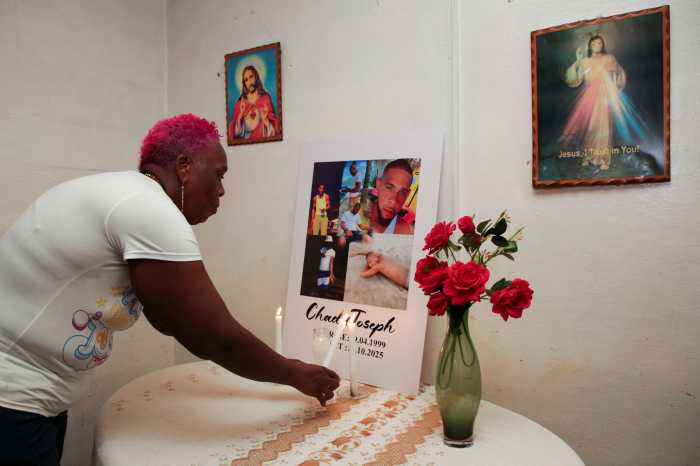Ruthie Berman with Ron Madson and Richard Dietz, co-plaintiffs with her and Connie Kurtz, in seeking domestic partner benefits from the city, at Kurtz’s June 14 memorial service at Congregation Beit Simchat Torah. | ANDY HUMM
Veteran lesbian activist Connie Kurtz, who died May 27 at age 81, got to speak at her own memorial service at Congregation Beit Simchat Torah (CBST) as her wife and partner of 44 years, Ruthie Berman, was surround by the love of their New York friends.
The June 14 service was two days after the second anniversary of the Pulse massacre and the LGBTQ synagogue was draped in Gilbert Baker-made Rainbow Flags bearing names of the 49 killed at that Orlando Latinx LGBTQ club. A video of Kurtz’s impassioned speech two years ago in Florida, where she and Berman lived in recent years, spoke loudly to us today: “We cannot wait for the next tragedy to happen! We need to vote and register people. That’s how I mourn.”
Rabbi Sharon Kleinbaum, who led this service as she did Kurtz’s funeral in West Palm Beach, said to Berman, “The last time I saw Connie she said to me, ‘Take care of Ruthie.’ In Connie’s memory, we are here to surround you with New York love. Connie is with us today.”
Surviving spouse Ruthie Berman surrounded by couple’s many New York friends
Kleinbaum also said, “Eighty-one was too early. How does one sum up a force of nature? It was all love with Ruthie and Connie” — the couple embracing and holding dear Connie’s ultraorthodox son Moishe and her secular, anti-religious daughter Eileen from her previous marriage.
“This is family values,” Kleinbaum said.
Moishe Kurtz had spoken movingly at his mother’s funeral, saying, “You honored everybody and that’s why everybody is honoring you… There’s not such far people like me and my mother, but we were so close!” Moishe gave his mother 12 grandchildren “who loved her.”
Berman spoke to us mourners in New York, admitting to nervousness, saying, “I’m used to speaking to people I don’t know. I can tell them anything.”
Connie Kurtz, 1936-2018. | COURTESY: CBST
The 2002 documentary about the couple was called “Ruthie and Connie: Every Room in the House,” and Berman spoke of how Connie inhabited every one of them — from the kitchen (“a great cook who was a culinary Jew”) to the bathroom, where Connie did her art, to the living room, where the two relaxed and enjoyed music.
“But the most important room was the bedroom,” Berman said. “In 44 years, we never went to sleep angry at each other.”
She also said, “We loved our life of activism and coming out was our theme.”
Among the mourners were Ron Madson and Richard Dietz, one of the two other couples who joined Kurtz and Berman in suing the New York City Board of Education for domestic partner benefits, a six-year case finally settled by Mayor David Dinkins for all municipals employees in 1993.
“Connie was a remarkably dedicated and energetic woman who knew what she wanted and how to get it,” Dietz said after the service.
Michael Levine of CBST spoke of how Kurtz and Berman got involved in the synagogue after overhearing him talking about it in a Village diner. When, in 1974, he heard a middle-aged Jewish woman saying, “So tell me about the gay synagogue,” he braced for an argument and instead got lifelong members and friends.
“CBST would not be what it is today without you and Connie,” Levine said to Berman.
Former State Senator Tom Duane, also addressing Berman, said, “Everything about you and Connie was out there, demanding to be seen.”
Veteran activist Jackie Rudin said she met Kurtz and Berman in 1988 “and they were my most treasured role models.” She added, “Connie’s eyes saw through to your soul… Her eyes told you everything was going to be all right.”
Kleinbaum read a eulogy from Donald Goldmacher, producer of the documentary about “these two brave women,” who said he “had known Ruthie since I was eight years old. She became my second older sister.” He explained he made the movie to “combat the hate of the right-wing religious.”
The last word belongs to Connie Kurtz, spoken after the Pulse horror: “I’m asking you to take your sorrow, your sadness, your scaredness and go out and introduce yourself at someone who knows the importance of making sure that we vote for people who not only on the day of election will be there for us but will be there for us when they are in office… As a Jew — in case you didn’t know I was Jewish — when we needed to deal with the Holocaust, we said, ‘Never again!’ And to me it meant never again to anyone — to the short and the tall and the fat and the thin and the lesbian and the gay and the transgender and the bisexual and the black and the brown. Never again!”
Amen.

